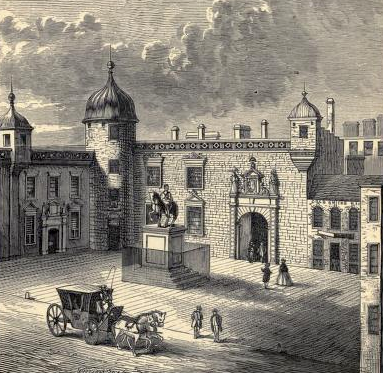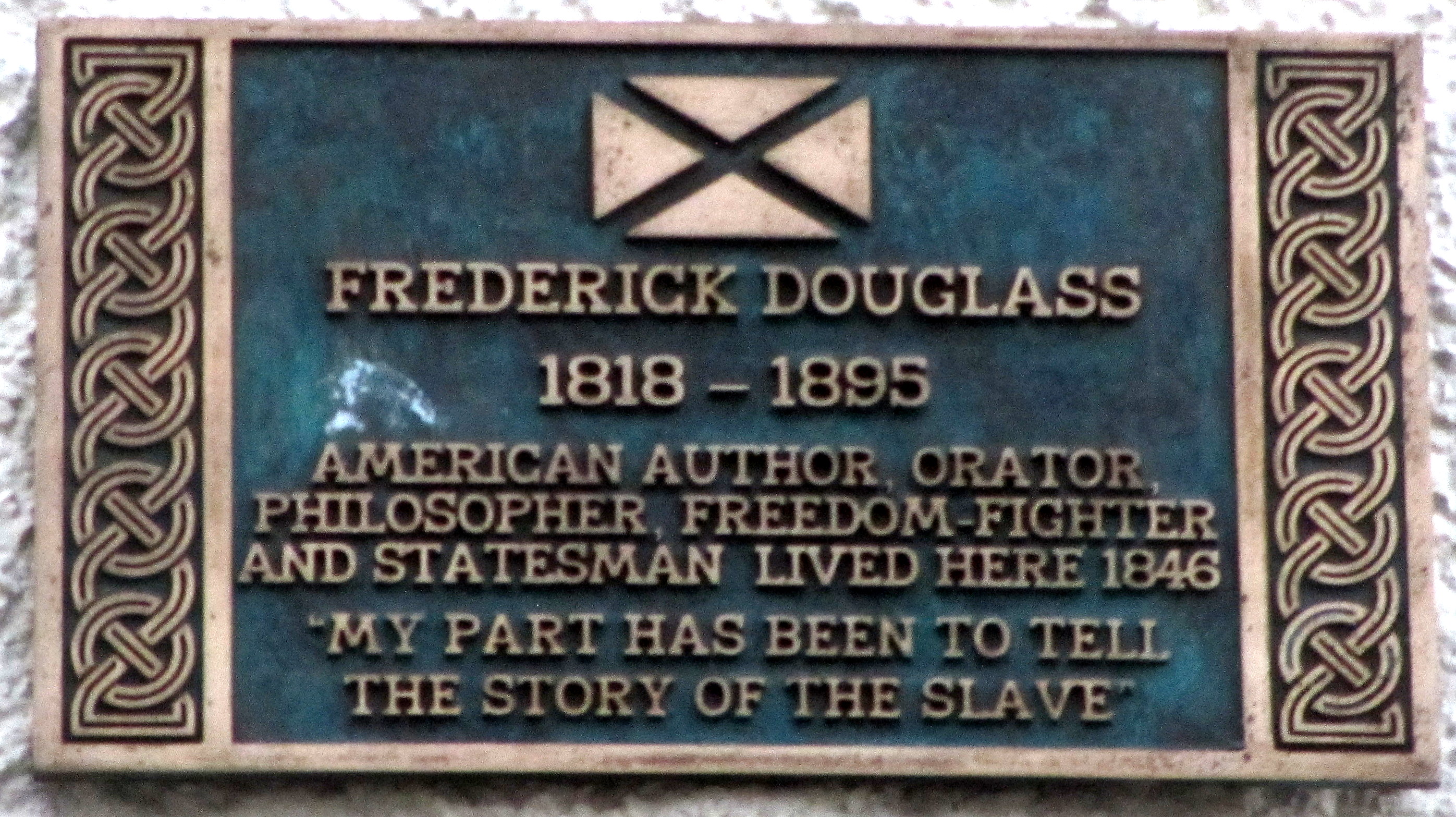
Frederick Douglass spent most of July in Belfast, where he attended the General Assembly of the Presbyterian Church of Ireland.. On his previous visit there he had lent his support to Rev. Isaac Nelson, who was hoping to persuade the Church to sever ties with its counterparts in the United States. While Nelson’s motion was watered down, the Assembly was much more forthright in its criticisms of the American churches than the Free Church of Scotland.
Another delegate was Thomas Chalmers‘s friend Rev Dr Thomas Smyth, of the Second Presbyterian Church in Charleston, returning to his home town. Smyth was responsible for raising much of the money donated to the Free Church in the American South. During his 1846 visit to Britain and Ireland, Smyth had incautiously repeated a rumour that Douglass had visited a brothel in Manchester. While letters flew back and forth between their lawyers, Douglass was pleased to note that Smyth was asked to exclude himself from the General Assembly’s proceedings. Smyth subsequently withdrew his libellous claim, although the affair clearly unsettled Douglass, who blamed ‘the foul slanders of this Revd. Manstealer’ for some ill-chosen remarks of his own in a letter to his friend in Cork, Isabel Jennings.1
Some time during the last week of the month, Douglass must have sailed to Ardrossan and taken the train to Glasgow and then to Edinburgh. On Thursday 30 July he wrote, not for the first time, of his admiration of the city:
You will perceive that I am now in Edingburgh[.] It is the capital of Scotland – and is justly regarded as one of the most beatuful cities in Urope. I never saw one with which for beauty elegance and grandeur to compare it. I have no time even had I the ability to describe it. You must come and see it if you ever visit this country. You will be delighted with it I am sure. The Monument to Sir Walter Scott – on princes street, is one conglomeration of architectural beauties. The Calton Hill – Salsbury Craggs and Arthur Seat give the city advantages over any City I have ever visited in this or in your country. I enjoy every thing here which may be enjoyed by those of a paler hue – no distinction here. I have found myself in the society of the Combes, the Crowe’s and the Chamber’s the first people of this city and no one seemed alarmed by my presence.2
On Friday 31 July, he addressed a meeting held to ‘commemorate the anniversary of the emancipation of slaves in the West Indies’ at Brighton Street Chapel. The brief report in the Edinburgh Evening Post suggests that Douglass spent some time discussing the proceedings in Belfast, but the meeting is especially noteworthy for his remarks on the Sugar Duties Act, expressing his disappoval of Parliament’s recent decision to equalise the tariffs on sugar imports. The duties had been increased after Emancipation to help fund the compensation promised to slaveholders, but with lower rates applied to colonial sugar in an effort to encourage the West Indian economy. The new measure would reduce the price of sugar but would boost imports of produce from slavery plantations in the United States, Cuba and Brazil. However, while the British and Foreign Anti-Slavery Society had fought hard to ensure the duties were retained (in a modified form), the issue had fallen by the wayside, and the legislation passed without significant protest. For many abolitionists, moral concerns tended to lose out when they clashed with their commitment to free trade.
In Edinburgh Douglass stayed at the home of Rev. James Robertson, Secretary of the newly-formed Scottish Anti-Slavery Society. There is now a plaque on the wall of 33 Gilmore Place marking Douglass’ visit.

The committee had set its hopes on Douglass becoming its agent. He initially refused, but it would seem that he managed to negotiate ‘satisfactory terms’ and agreed to ‘labor in Scotland for a while’ on its behalf.3
A notice duly appeared in the Scotsman announcing his appointment:
The Committee of the Scottish Anti-Slavery Society have much pleasure in giving notice, that they have now secured as their Agent Mr FREDERICK DOUGLAS, formerly a Slave in the United States, and that he is to be employed in the advocacy of the great cause on account of which he has visited this country. The Committee hope that all the friends of humanity throughout the country will bestir themselves, and lend their aid in opening up places where Mr Douglas may have opportunities of pleading the cause of three millions of human beings who are groaning under the yoke of the oppressor. The Committee are assured that the people of Scotland are fully satisfied that SLAVERY is at once wicked and unjustifiable; but recent proceedings in certain quarters have revealed the fact that there are parties in this country, who, while they denounce Slavery as a system, are disposed to justify and excuse the Slaveholder, – receiving him to Christian fellowship, speaking of and acting towards him as a person who is rather to be sympathised with than blamed.
It will be the object of Mr Douglas not only to reveal what American slavery really is, but also to convince all whom he is privileged to address, that the slaveholder is a sinner of unrivalled magnitude – that he is guilty of the highest and most daring kind of theft – that he is to all intents and purposes a manstealer – that no man can claim property in his fellow-man without being guilty of unmitigated villany – and that every slave holder is as much deserving of being excluded from Christian fellowship as the man who lives by sheep-stealing, or who pursues the daring employment of a highwayman.
The eminent talents of Mr Douglas are already so well known to the public, that the Committee consider any communication on their part unnecessary.
As Mr Douglas will be at liberty to commence his labours on the 15th inst., parties wishing one or more lectures from Mr Douglas will please to correspond early with the Secretary, who will arrange as to the time when a visit from Mr Douglas can be obtained.
In name and by appointment of the Committee,
JAMES ROBERTSON, Secretary.
Edinburgh, 33 Gilmore Place,
4th August 1846.4
But by then Douglass was already south of the border. The day after his speech at Brighton Street Chapel, Douglass took the coach to Newcastle, describing the journey in a letter:
Our passengers seemed to be Stupid set – giving little or no Signs of life – except when the coach changed horses and then only when they stood in the inspiring presence of “John Barley Corn.” I felt sorry to see them tippling the whisky. But for one to lecture on such occasion is like casting ones pearl before swine. So I looked on in Silence – speaking only by example. I am deeply convinced that the great sin of Scotland – is the use of ardent Spirits as a beverage.5
And he was soon in London to meet his abolitionist colleague William Lloyd Garrison, newly arrived from Massachusetts. He would return to Scotland with Garrison to address more meetings, but not for another seven weeks.
For an overview of Douglass’s activities in Edinburgh during the year, see Spotlight: Edinburgh.
SCOTTISH ANTI-SLAVERY SOCIETY. – A meeting of this Society was held on Friday night in Brighton Street Chapel, to commemorate the anniversary of the emancipation of slaves in the West Indies. The meeting was but thinly attended. Mr Douglass addressed the meeting for about two hours. He took occasion shortly to refer to the measure which had been introduced by the Government on the sugar duties, and stated that it could not meet with his approval.
Instead of regarding it as indicative of advance in morality by the English people, he looked upon it in the light of a retrograde movement. The people of England, who were so anxious to sweeten their palates, should bear in mind that they were about to do so at the expense of the bones and blood of their fellow creatures.
Mr Douglas then contrasted the conduct of the Irish Presbyterian Assembly with that of the Free Church on the subject of slavery, and adverted to the refusal of the Irish Assembly to invite Dr Smith of Charleston to become an honorary member, on account of his connection with the slave churches of America.
Edinburgh Evening Post, 5 August 1846 (reprinted in the Caledonian Mercury, 6 August 1846).
Notes
- Frederick Douglass to Isabel Jennings, Edinburgh 30 July 1846 in The Frederick Douglass Papers, Series Three: Correspondence, Volume 1: 1842–52, edited by John R. McKivigan (New Haven: Yale University Press, 2009), p. 152.
- Frederick Douglass to William A White, Edinburgh, 30 July 1846 in The Frederick Douglass Papers, Series Three: Correspondence, Volume 1: 1842–52, edited by John R. McKivigan (New Haven: Yale University Press, 2009), p. 149
- Frederick Douglass to Anon, Edinburgh, 30 July 1846 in The Life and Writings of Frederick Douglass, Volume V: Supplementary Volume, 1844–1860, edited by Philip S. Foner (New York: International Publishers, 1975), p. 46.
- ‘Scottish Anti-Slavery Society,’ Scotsman, 8 August 1846.
- Frederick Douglass to Eliza Nicholson, Newcastle, 1 August 1846 in The Frederick Douglass Papers, Series Three: Correspondence, Volume 1: 1842–52, edited by John R. McKivigan (New Haven: Yale University Press, 2009), p. 154.